It happened again! On April 22, 2022 (please also note the date!) 5 ingenious linguistics students competed with great humorous and performative (pun intended) abilities against each other to win in the four categories “poetry”, “academia”, “creativity” and “humor”, and not least – in anticipation for the overall winner – the LingoSlam trophy. The latter led to a surprise, but more on that later. Everything was, as usual, carried forward by a high-spirited and cheering crowd!
LingoSlam is a long-standing tradition that has always been a testament to the ingenuity, high professionalism and not least the ability and willingness of linguistics students to entertain a large crowd of like-minded people.
LingoSlam was invented and for many years organized by Peter Bakker, usually with a student or ex-student as a host, and Peter himself as the “gift father” for the lucky winners.
But this year it was different. The whole event was excellently organized by our students Charlotte Sandager Bilde, Cecilie Paaske Palle Kehling and Joachim Hjorth Erlandsen. The latter also acted as the event’s bubbly host. All the team did an amazing job. Woohoo! Peter “only” kept his role as a gift father, and when I say “only”, it is because the gift ceremony is always a show in itself. But more on that later!
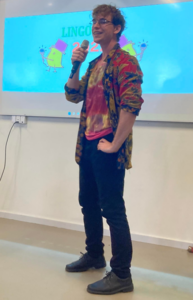
Who competed, and what did we witness?
Gustav Styrbjørn Johannesen started out with a breathtaking review of the qualifications he had acquired as a linguistics student, spiced with extra suffixes on adjectives (productivous, syntacticulous), which should be introduced in the Oxford Dictionary solely for their aesthetic value. Gustav also showed that he could list all 7000 languages of the world – at least the first thirty. It was all sung with Gustav’s beautiful baritone voice, with interludes on the elegant instrument the kazoo – which lead to the conclusion that Gustav still did not really know what he could use his linguistic knowledge for.
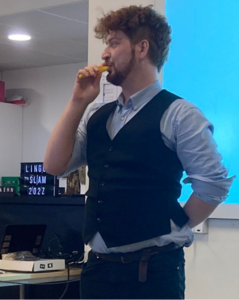
The next speaker was Geertje Graehn, with a German background, who led us into the wonderful world of German grammatical gender, which is so intricate that even German speakers do not what’s what. Somewords, i.a. “Yogurt”, is used with either “der”, “die” or “das”, depending on who you are. Regional differences are only part of the explanation, which Geertje’s language maps showed us – they were splatter-painted in different colors to a degree which would have made Jackson Pollock envious. But Geertje’s ace up her sleeve was our all-time favorite spread – NUTELLA! While only a few people in the West of Germany (a possible French influence) accept “der” (DER Nutella!), the rest of the German-speaking area agrees that “der” is definitely excluded. The question of whether it is “die” (possibly due to the female-insinuating suffix in “-ella”) or “das” (denotes a substance) provokes heated debate among our audience – as it did with our audience in the ensuing break!
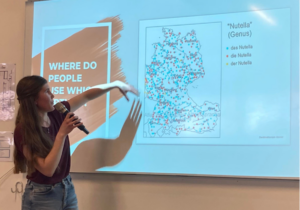
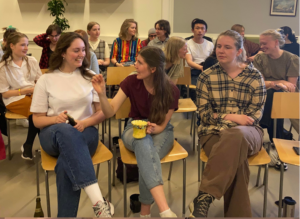
After the break, the culinary theme continued with Søren Sandager Sørensen as Baker-Søren, who this time did not bake “sandkage” (shortbread), but a stuffed onion, which presented the stratification of a sentence. Baker-Søren mixed a predicate cream consisting of morphology (margarine), phonology (cocoa powder), linguistic laws (sugar), grammar (flour), grammaticality (baking powder), semiotics (milk), syntax (vanilla) and salt (salt). To turn it into a state of affairs, he added reference (chocolate), and in order to make it a proposition, he added tempus and epistemic modification (lemon). Finally, Baker-Søren completed the sentence with an illocution (maple syrup) to obtain a speech act. He then spread this delicate cream in between the layers of a whole onion artfully divided in layers and then used the maximum processing time (2 minutes for a very long onion) in his microwave that he brought along. Finally, he made a cross-section, which he also explained on the white board with all the layers (and yes, he also ate some of it himself and generously offered a taste to the audience, who always likes to be involved and get a taste of research themselves).
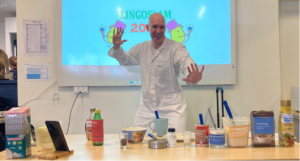
The next participant, Thea Helene Nørgaard, used the spotlight to come out of the closet. In an institute dominated by cat lovers and owners, Thea outed herself for the very first time as a lone dog lover. And Thea had a point: by a large number of cat photo documentation with both teachers and students, she could provide evidence that these people were cat lovers and possibly cat owners. Where documentation was lacking, Thea extrapolated using dexterous photo montages. But Thea offers much more than just being a dog lover – she is also a dog communication researcher. Thea showed treats 🦴from her already substantial research in dog conversation analysis, above all the so-called “play bow”, the dog’s invitation to play, and the places in dog conversations where this can occur. Thea’s fascinating insight into dogs’ complex conversations certainly opens the department’s cat lovers’ eye to the dog’s world, as well as gives other, hitherto hidden, dog lovers the courage to stand up. This is called linguistics in the service of society!
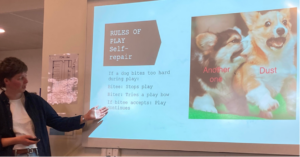
Last, but not least, Liv Moeslund Ahlgren presented a journalistic revelation that made the audience speechless – and which will surely make more people in the Danish landscape just as speechless once the message spreads! Liv had noticed an increasing number of articles in smaller newspapers warning of the linguistic genre of “nagging”. Not only does nagging, according to the articles, ruin the good climate of cooperation in companies, undermine work ethic and productivity, but – how worrying – also makes those who cultivate this genre cognitively weaker – or, as was directly expressed, “dumber”! Their hippocampal area in the brain becomes smaller! Liv did not want to take such a risk, so she looked for the original research that was behind it – and found out that it did not exist. In return, most article writers who warned against nagging coincidentally offered a nag-oriented service right after the article text. But that was not where the case stopped: through even deeper journalistic work, Liv was able to reveal that it all actually originated in a neoliberal conspiracy that seeks to silence people who had good reasons to point out bad conditions! Hereby another contribution in the service of society! And something tells me this is not the last we’ve heard of that case!
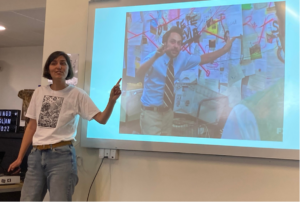
Jury panel. After each presentation, a panel of jurors, consisting of Jakob Steensig, Christopher Martin Mikkelsen Cox and yours truly AK, had to comment on the feature with a few improvised remarks – and so we were put to work this afternoon after all! The biggest achievement, however, came from Jakob, who tasted Baker-Søren’s onion with cocoa cream.
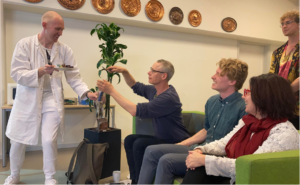
However, the jurors should not vote at all – the audience should, of course! It was done electronically and eventually led to the big surprise! Something like this had never been seen before!
The result. First, it had to be seen which candidates had won the special prizes. It became:
• Gustav for “poetry”
• Geertje for “academia”
• Søren for “creativity”
• Thea for “humor”
And then it was time to reveal the winner over them all! … drum roll…. And the winner was: Gustav AND Thea! By an incredible, unpredictable, completely random equal number of votes! Which, of course, right away, led to the huge conundrum of what to do with the single-piece trophy. (I think they have found a solution in the meantime!)
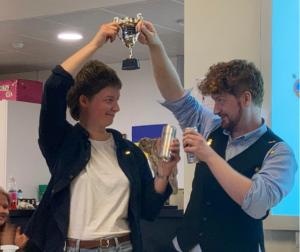
It is raining gifts! But no LingoSlam without a true shower of gifts! At this point, gift-father Peter came into play again. And as always, there was a solid mix of “Peter gifts” and valuable gifts. This time all presented before the distribution, always with the explanation that there could be a difference in color and size. The Peter gifts this year were: a trip to Barbados (docu on DVD), a real helicopter (toy – in original packaging; batteries were missing, though) and – as usual – millions worth of money (in foreign and perhaps discontinued currency, or gambling money). The winners declared themselves immodest and accepted the money, but also the helicopter and the trip to Barbados found new owners. In the end, this year’s two winners were bestoved with a ticket each to this year’s Liet festival in Tønder, an annual festival with songs in minority languages. Another, genuine, expensive gift (we never know where Peter gets them from!) was a pair of headphones in original packaging that none of the winners dared accept, after which Peter eventually pushed the audience until he found one person, who gave in and accepted! A CIA linguist lanchart went to one of the winners, while 28 Danish letters on cloth were reserved for one of Peter’s acquaintances, who had previously expressed interest in it.
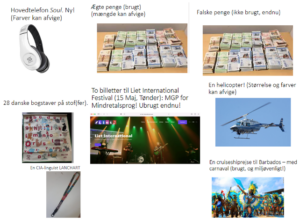
Finally, Peter came up with another shower: big, golden confetti rain on this year’s winners!!
Congratulations to Thea and Gustav and congratulations to the organizing committee, and many thanks to the very best audience in the world!
Postlude. Lingoslam went green this year. This happened within the categories “recycling” and “saving resources”.
a. Recycling: recycling of LingoSlam confetti at yours truly’s dinner party the next day (picture: yours truly):
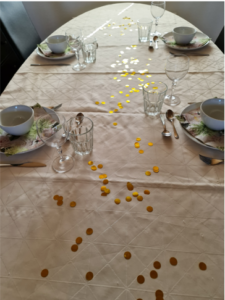
b. Saving of resources: this year’s Lingoslam winner received only half a trophy.
Post-postlude. Besides Gustav and Thea, Søren and Liv equally managed to visit “Liet” festival in Tønder. Read about their experiences here (Danish), here (Danish) and here (English).
Thanks to: Charlotte Sandager Bilde und Peter Bakker for picture material; Charlotte Sandager Bilde, Gustav Styrbjørn Johannesen, Liv Moeslund Ahlgren and Søren Sandager Sørensen for helping my short long-term memory along the way; the linguistics students’ event association ViGør for further help with the organization.
Alexandra R. Kratschmer is an associate professor of Linguistics at Aarhus University and has been seen in pajamas on the occasion of a previous LingoSlam.





1 thought on “LingoSlam 2022! More exciting than ever!”